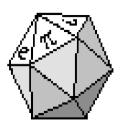Yahoo Answers is shutting down on May 4th, 2021 (Eastern Time) and beginning April 20th, 2021 (Eastern Time) the Yahoo Answers website will be in read-only mode. There will be no changes to other Yahoo properties or services, or your Yahoo account. You can find more information about the Yahoo Answers shutdown and how to download your data on this help page.
Trending News
Is this series well-known? Σ (-1)ⁿ τ(2n+1)/(2n+1)?
Where τ(N) is the number of positive integer divisors of N, including N.
http://planetmath.org/encyclopedia/TauFunction.htm...
Is it well-known (and can anyone provide a reference) whether the alternating sum:
Σ (-1)ⁿ τ(2n+1)/(2n+1) for n=0 to ∞
diverges or converges (and if so to what)?
{I think I know the limit, if it exists, but I'm still checking details of my proof. Changing the order of addition is very dangerous with infinite series!}
Thanks for confirming the limit Gianlino! It took me forever to get what looks like a rigorous error estimate on the sequence of partial sums, looking at
ΣΣ(-1)^(k+m)/[(2k+1)(2m+1)].
Standard alternating series error gives errors with absolute value about 1/N, for each of N subsequences. Good enough to avoid infinity, but not enough to prove convergence!
I think that the error goes to zero like Ln(N)/N, but the sign does not alternate. For example, out around N=10000, there are 15 partial sums in a row all below the limit, one by more that 0.001, then 3 above, another below and 3 more above. The partial sums wander quite a bit.
But my real question: Is this result well-known? Or perhaps considered too easy to comment??
{Credit to the person who asked me. Adhel asks good questions: http://answers.yahoo.com/question/index;_ylt=AtLoC... }
2 Answers
- gianlinoLv 710 years agoFavorite Answer
Did you find pi^2 / 16?
I believe you can show it converges if you avoid infinite series and go to partial sums. You rearrange according to divisors. For finite sums you are totally free to do so. Then the balance between numbers of the form 4k+1 and 4k+3, as well as standard alternate series estimates, allow to show the error goes to zero.
Since you seem well ahead, I didn't write the details so I may be off.
edit If you just want convergence, an error in 1 / sqrt(N) is not hard to get. You just group the d's in d|n according to the number of mutiples less than N.
Each grouping gives you 1/N because inside these groupings the errors do alternate. The number of groups is roughly K sqrt(N) with K < 2. So that's it.
Didn't find this series on the net but given what you find here
http://mathworld.wolfram.com/DivisorFunction.html
it's probably known to some people
- 10 years ago
Did you find pi^2 / 16?
I believe you can show it converges if you avoid infinite series and go to partial sums. You rearrange according to divisors. For finite sums you are totally free to do so. Then the balance between numbers of the form 4k+1 and 4k+3, as well as standard alternate series estimates, allow to show the error goes to zero.
Since you seem well ahead, I didn't write the details so I may be off.
wow gianlino...copying me
Source(s): college mathematics teacher



